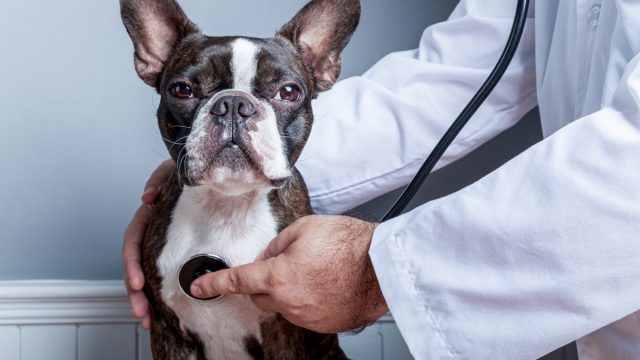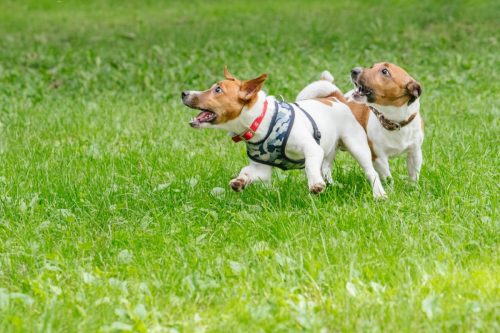Mystery Dog Illness Spreading Across the U.S.—These Breeds Are Most at Risk

We’re committed to keeping our four-legged friends safe and healthy, which means getting them regular checkups and going to the vet whenever they feel under the weather. But in recent weeks, this has become a more challenging prospect for dog owners, largely due to a mystery illness that’s rapidly spreading across the U.S. Now, experts say there are specific breeds that are the most at risk of severe complications. Read on to find out which dog owners need to be on high alert.
RELATED: Veterinarians Issue Urgent Warning to Dog Owners as “Severe, Fast-Moving” Illness Spreads.
Experts aren’t sure what exactly is making dogs sick.

Over the past several months, a severe respiratory illness has hit dogs across the country. Cases were reported in at least 14 states, according to the American Veterinary Medical Association, per Reuters.
Currently, experts are trying to determine what’s causing the outbreak—including whether it’s viral or bacterial. Sick dogs have been tested for common respiratory diseases that show similar symptoms, but tests aren’t coming back positive.
As Andrea Cantu-Schomus, communications director with the Oregon Department of Agriculture (ODA), explained in a press release, some cases have tested positive for the bacteria M. cynos, but that is “not believed to be the underlying causative agent.”
The ODA—which has received over 200 case reports from vets since mid-August—is working with other emergency veterinary practices to begin widespread sampling of these cases, which could lead to more guidance and information about the disease.
RELATED: 5 Best Ways to Protect Your Dog From the Deadly New Mystery Illness Spreading.
Certain dogs have an increased risk.

While the disease doesn’t exclusively affect one group of dogs, NBC News reports that brachycephalic (flat-faced) breeds are typically more at risk of developing pneumonia after being infected with a respiratory disease. Brachycephalic breeds include French Bulldogs, Bulldogs, Boxers, Cavalier King Charles Spaniels, Boston Terriers, Mastiffs, and Pugs, per the Humane Society Veterinary Medical Association.
Senior dogs and those who already have underlying lung disease are also more at risk for pneumonia, per NBC News.
There were, however, some cases of “atypical canine respiratory disease” this spring at the Texas A&M School of Veterinary Medicine, Kate Aicher, DVM, told the outlet. These young, vaccinated dogs had a sudden fever and cases that varied in severity.
“You don’t expect 1- and 2-year-old dogs who are well conditioned and healthy to end up with pneumonia so severe that they need to be put on a ventilator and then die,” she told the outlet. “You don’t expect dogs to die despite aggressive care.”
Aicher added that 75 percent of the dogs at Texas A&M tested positive for a known pathogen, but 25 percent of sick dogs didn’t show anything on their tests.
RELATED: 8 Dog Breeds With the Worst Health Problems, Vet Tech Warns.
There may be other factors at play.

NBC News also pointed to other factors that may be playing a role in the infection uptick.
During the COVID-19 pandemic, dogs were kept out of boarding facilities and daycare, meaning they might not have been exposed to certain viruses and bacteria. Vaccination rates for canines are also decreasing, experts told NBC News.
“We’ve got more dogs that have a lower level of resistance because they’ve been exposed less over the last couple of years and they’ve had less vaccination,” Scott Weese, DVM, an infectious disease veterinarian at the Ontario Veterinary College, said. “So that means just with our normal respiratory disease that’s always there and always circulating around, we can see more disease and more spikes.”
While researchers at the University of New Hampshire (UNH) recently identified bacteria (potentially part of the dog microbiome) that may have developed the ability to cause the disease, Deborah Silverstein, DVM, section chief of emergency medicine and critical care at the Ryan Veterinary Hospital at the University of Pennsylvania, told NBC News that an existing bug could have also “changed in its virulence.” She compared the situation to the evolving COVID strains, which vary in severity.
In terms of severe illness, Silverstein noted that could also be due to dogs being infected with multiple pathogens simultaneously.
Keep an eye out for these symptoms, but don’t panic.

Sick dogs will typically develop a cough as an initial symptom, which can be accompanied by coughing, sneezing, nasal or eye discharge, and lethargy, according to the ODA. If your dog shows these symptoms, contact your veterinarian.
But while the spread of an unknown illness is disconcerting, experts say that periodic outbreaks of Canine Infectious Respiratory Disease Complex (CIRDC) can happen in dog populations. In general, they recommend caution as opposed to panic.
“Being aware is good, being anxious is bad, freaking out is definitely unnecessary,” Weese wrote in a Nov. 27 post on his Worms and Germs Blog. “The vast majority of dogs that get CIRDC recover uneventfully. That’s as true now as it was a year or 10 years ago. However, severe disease can occur so we don’t want to be too dismissive.”
The ODA recommends certain precautions, including ensuring your dog is up to date with vaccines and limiting their exposure to settings with unknown dogs. Communal water bowls and toys should be avoided, as should playdates with unknown dogs (unless you can create a playgroup of known vaccinated dogs).
RELATED: For more up-to-date information, sign up for our daily newsletter.